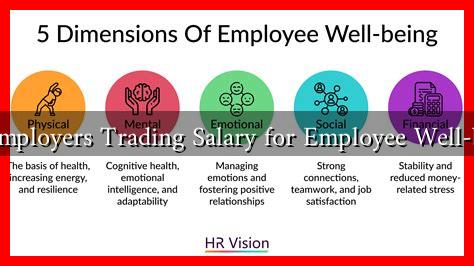-
Table of Contents
Are Employers Trading Salary for Employee Well-being?
In recent years, the conversation around employee well-being has gained significant traction. As organizations strive to attract and retain top talent, many are beginning to prioritize employee well-being over traditional salary structures. This shift raises an important question: Are employers trading salary for employee well-being? This article explores the evolving landscape of employee compensation, the importance of well-being initiatives, and the implications for both employers and employees.
The Shift in Employee Expectations
Today’s workforce is increasingly prioritizing well-being over monetary compensation. A survey conducted by Gallup found that 53% of employees would consider leaving their current job for one that offers better well-being support. This shift is driven by several factors:
- Work-Life Balance: Employees are seeking flexible work arrangements that allow them to balance personal and professional responsibilities.
- Mental Health Awareness: The stigma surrounding mental health has decreased, leading employees to prioritize workplaces that support mental well-being.
- Holistic Benefits: Employees are looking for comprehensive benefits packages that include wellness programs, health insurance, and financial planning services.
Well-being Initiatives: A New Form of Compensation
Employers are responding to these changing expectations by implementing various well-being initiatives. These initiatives can take many forms, including:
- Flexible Work Hours: Allowing employees to choose their working hours can lead to increased job satisfaction and productivity.
- Remote Work Options: The COVID-19 pandemic accelerated the adoption of remote work, and many employees now prefer this arrangement for its convenience.
- Wellness Programs: Companies are investing in wellness programs that promote physical and mental health, such as gym memberships, meditation sessions, and stress management workshops.
- Employee Assistance Programs (EAPs): EAPs provide confidential counseling and support services to help employees navigate personal and professional challenges.
Case Studies: Companies Leading the Way
Several companies have successfully integrated well-being initiatives into their workplace culture, demonstrating the potential benefits of this approach:
- Salesforce: The tech giant has invested heavily in employee well-being, offering mental health days, wellness reimbursement programs, and access to mental health professionals. As a result, Salesforce reported a 30% increase in employee satisfaction.
- Google: Known for its innovative workplace culture, Google provides employees with access to on-site wellness facilities, fitness classes, and healthy meal options. This commitment to well-being has contributed to its reputation as one of the best places to work.
- Microsoft: The company has implemented a “no-meeting” policy on certain days to reduce burnout and promote work-life balance. This initiative has led to increased productivity and employee engagement.
The Financial Implications for Employers
While investing in employee well-being may seem costly, the long-term benefits can outweigh the initial expenses. Research from the Wellness Council of America indicates that companies that prioritize employee well-being can see:
- Reduced Turnover Costs: High turnover rates can be expensive; investing in well-being can lead to lower attrition rates.
- Increased Productivity: Healthier employees are more productive, leading to improved overall performance.
- Enhanced Company Reputation: Companies known for prioritizing employee well-being attract top talent and foster a positive workplace culture.
Conclusion: A Balanced Approach to Compensation
As the workforce continues to evolve, employers must adapt to the changing landscape of employee expectations. While salary remains an important factor in job satisfaction, the growing emphasis on well-being initiatives suggests that employers are indeed trading salary for employee well-being. By investing in holistic well-being programs, companies can create a more engaged, productive, and satisfied workforce. Ultimately, the balance between salary and well-being will define the future of work, making it essential for employers to prioritize both aspects to thrive in a competitive job market.


